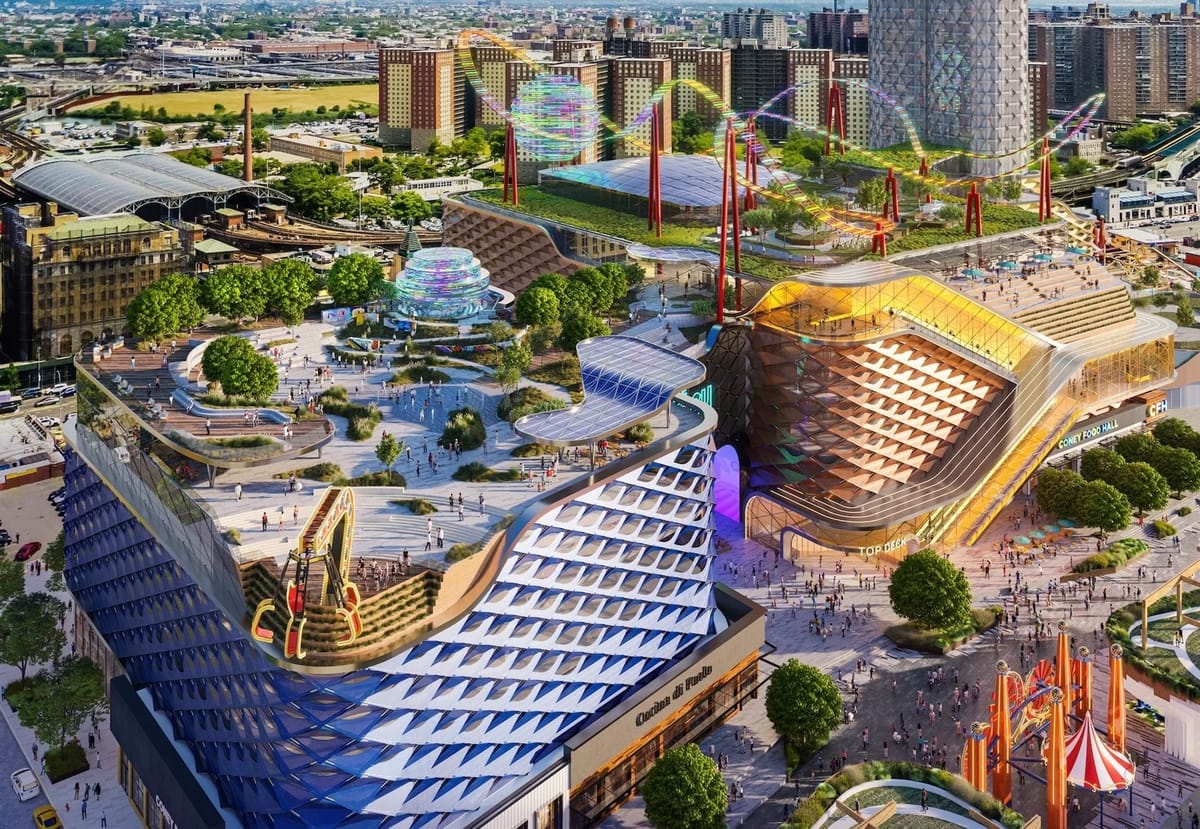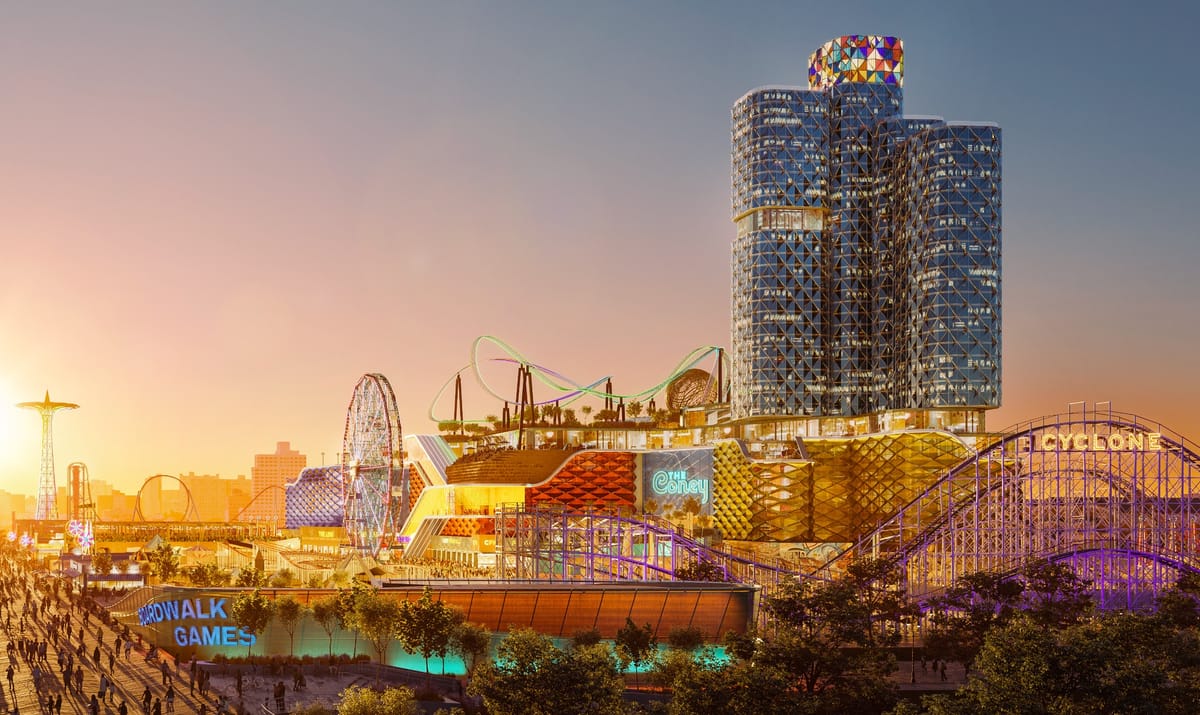Your last chance to speak out against the Coney Island casino is coming up
After a summer of activism, the final public hearing is coming up next week

If you don’t want to gamble the future of Coney Island on a casino, opponents say it’s time to go all in.
The final public hearing over the plan to erect a massive $3 billion casino complex that would gobble up the skyline and remake the DNA of the People’s Playground is coming up on Wednesday. Opponents are asking for an all-hands-on-deck showing in person, online and through email to speak up about the project. After that, the project's Community Advisory Committee — the group of local lawmakers assembled to evaluate each casino proposal in the city — will vote on whether to send it to the state for consideration for one the three downstate casino license that will become available. The committee is expected to vote on the project by the end of the month, and casino licenses are expected to be awarded by end of the year.
Even if the committee does sign off on the casino, it’s far from a done deal; the developer behind the project would have to beat out several other deep-pocketed and seemingly more successful developers, including Mets owner Steve Cohen and a company backed by Jay-Z. Thor Equities — the developer behind the Coney project, which has been promising to “revitalize” the amusement district since the Bloomberg administration — has faced headwinds from community opposition all summer. Thor is partnering with Chickasaw Nation, which owns a string of casinos in Oklahoma.
But opponents are taking no chances. The first public hearing about the proposal, on Aug. 26, was full of opponents of the plan, but also supporters, who claimed the casino would bring jobs and safety to the neighborhood. Adam Rinn, the artistic director of nonprofit Coney Island USA, accused the developer of busing in union hotel workers and paying other supporters to attend the meeting. Thor Equities did not respond to a request for comment.
The City Council in June already cleared the way for a crucial rezoning that would allow public streets to be “demapped” for the project, giving the developer air rights to build a pedestrian skyway over two main beach access streets.
“As a grassroots organization, we really have come a huge distance,” Rinn told The Groove. “We’ve been getting notice, we’re seen, and we’re happy about that, and we’re heard.”
The second and final public hearing of the Community Advisory Committee will be held on Sept. 10, from 5 p.m. to 9 p.m. at the Coney Island YMCA (2980 West 29th St.)
The meeting will also be streamed on YouTube.
Comments can be submitted ahead of time via email to TheConeyPublicComment@nystec.com
Opponents of the plan say a casino is a gross choice to put in the middle of one of the most democratically, chaotically enjoyed beachfronts in all of America, and they point to Atlantic City as an example, where a rash of casino closings in recent years have combined with persistent crime rates to keep it ranked one of the poorest cities in New Jersey. But beyond that, they say Thor’s failure to turn the often-empty lots it owns in Coney Island into anything other than a chain candy store, fake arcade, failed Wahlburgers (allegedly rife with wage theft) and failed crab restaurant in recent years is reason enough not to trust them with a sprawling, 40-story, three-block-wide casino and hotel complex.
No games here: Help us keep you informed and active by become a member of The Groove today for as little as $6 a month and you'll unlock sweet perks too!
“Their promises of revitalizing the community, contributing to the community; if you look at what they’ve done for the past 15 years, it's pretty much nothing,” said Lola Star, who ran a boutique on the boardwalk until a 400% rent hike with a separate landlord forced her to close in 2020. “Right now they’re claiming they need a casino because the redevelopment has failed. I think they’re at fault for a lot of it. There’s just so much potential for developing that land in the right way.”
Star and other boardwalk faithful with Save Coney Island are organizing a rally and fundraiser called the Creature Ball at Rubulad in Bushwick this weekend to help raise awareness about the campaign. The event will help raise funds to take legal action to stop the process too: Star and other activists believe that the pro-casino forces engaged in coercion and violated laws while seeking approvals and are want to prove it in court. Sunday’s Creature Ball is described as “Mermaid Parade after dark,” with burlesque, dancing, bands, illusions and a dance floor full of costumed creatures.

“It’s been clear at these hearings that the community does not want a casino, and it does not represent Coney Island," Star said. "I’m hopeful.”
'Seems like an impossible get'
The betting odds are against the Coney casino becoming a reality. Council Member Justin Brannan represents the area in City Council, and chairs the advisory committee. His run for Comptroller in June drew outside spending from a pro-casino lobbyist. But he got crushed in the primary race for comptroller in June, in a campaign during which opponents frequently dinged him over his ties to the casino.
Industry publication Casino Reports ranked the Coney project dead last among the eight casino pitches in the city in two separate analysis pieces this summer. One called it “the underdog of the underdogs” and “saying it “seems like an impossible get;” another said it was “a nice idea in theory, but there has been little fanfare behind the proposal. Additionally, residents and local government are against it. That is almost always a fatal combination (see Hudson Yards).”

Residents and fans of the boardwalk neighborhood also have good cause to be scared that the project would rip up the neighborhood, disrupt annual events like the Mermaid Parade, draw more car traffic and create another locus for pernicious gambling addiction, just to go under in a few years. Casinos everywhere are struggling right now as the spread of gambling apps on phones require no travel or pallor of cheap glamor to lose your life savings. Even Las Vegas is struggling, facing its worst downturn since the Great Recession. Thor equities itself has faced foreclosures on its properties in Soho, Harlem and on the Bowery over the past year.
The project includes promises of community funding for things like safety and job training, but promises like that have a way of not materializing — just look at what happened with Atlantic Yards and Barclays Center, where the current developers in charge of finishing the project’s remaining affordable housing units skirted millions of dollars in penalties this year for failing to build the promised units.
Their proposal calls for multi-use spaces in the casino complex including a concert venue; but Coney Island already has a concert venue on the boardwalk that struggled to book any acts this year (its lone standout event, a Shrek rave last week, might have seemed like a scene, but the videos I saw of it made it look more fun in concept than execution).
'The city’s most successful un-developer'
Thor and its chairman Joe Sitt has been salivating for a massive hotel or casino on its land since the late aughts, and pushed for a rezoning during the Bloomberg administration, but has failed to make any major moves toward it since, seemingly warehousing the land in the hopes of one day being allowed to build a casino.
“Sitt is the city’s most successful un-developer,” Michael Daly wrote in The Daily News in 2009, after the rezoning. “He spoke grandly of building a billion-dollar Las Vegas-style resort. What he has built is a string of vacant lots.”
At that time, the developer seemed to be taking swipes at the very foundational legacy of Coney Island: in 2012, it failed to come to a lease agreement with McCullough’s Kiddie Park, a staple of Coney’s Bowery for half a century. The family that ran that park were descendents of Steeplechase Park founder George C. Tilyou, whose face is the literal mascot of Coney Island, and amusements around the world, according to Coney blog Amusing the Zillion (now sadly a defunct blog).
The casino proposal, and the past 15 years of Coney Island, seem to show Sitt has very little understanding of the real appeal of Coney Island. It is never going to be in one big massive attraction that dominates the skyline. It’s not Foxwoods, you don’t go there to be locked in a building with chain stores and no clocks, specifically designed to keep you indoors, losing money to one corporation (to me it's an idea that echoes this Times piece on how "America's most important market today is its affluent"). You go to have a chaotic experience, to mix and mingle with the live wire thrum of New Yorkers.
For instance, on Friday night, after a Cyclones game, at which I was served a semi-irresponsible 75 oz. of free beer with my $20 ticket, my friends and I went down the boardwalk and smoked a joint while watching fireworks light up the sky. We moved with the late-summer scrum of revelers on the boardwalk as we passed one of the many large speakers belting music, this one playing Bad Bunny’s “DtMF” and everyone in the scrum started dancing. We passed girls with snakes on their shoulders, men selling bucket hats off blankets, someone cooking food out of a shopping cart. Callie (fiancé of the blog) and I made our way over to the Wonder Wheel, where we kissed at the top of one of the best views in America: not just the splashes of light thrumming up from under us, but also all the people writhing below, getting their last gasp of summer in before school starts, our car rising high above them before sending us swinging down to rejoin them, unimpeded by a 40-story casino tower.
We met up with the rest of our friends at Freak Bar, where someone fondled a mannequin and someone else showed us a riveting video from the Jaws burlesque show that had just ended.
Rinn and Coney Island USA are the guardians of Coney's freak show and its exhbitionist spirt, but he said the developers of the casino have still yet to reach out to his organization in any way. He takes encouragement from those industry publication rankings that put Coney dead last.
“They all say that due to very loud, very aggressive, very tight community rejection, the community does not want it,” he said. “That tells me that as a community we have done our job.”






Comments ()